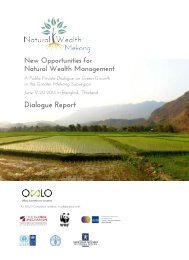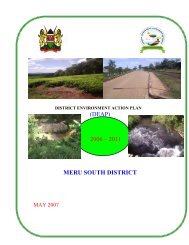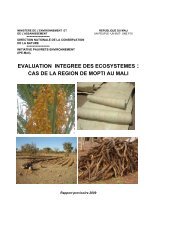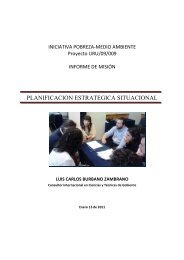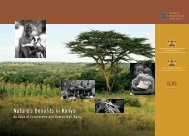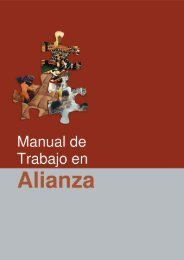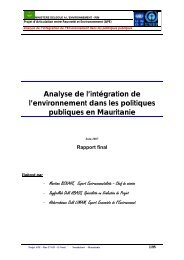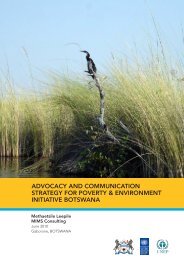WORKSHOP REPORT - UNDP-UNEP Poverty Environment Initiative
WORKSHOP REPORT - UNDP-UNEP Poverty Environment Initiative
WORKSHOP REPORT - UNDP-UNEP Poverty Environment Initiative
You also want an ePaper? Increase the reach of your titles
YUMPU automatically turns print PDFs into web optimized ePapers that Google loves.
GOB-<strong>UNDP</strong>-<strong>UNEP</strong> <strong>Poverty</strong> <strong>Environment</strong> <strong>Initiative</strong><br />
Table 1: PEI Botswana programme outcomes and activities<br />
Outcome Activities<br />
Output 1: Economic evidence of<br />
benefits, costs and impact of<br />
environmental degradation and<br />
climate change generated and<br />
disseminated<br />
Outcome 2: Knowledge and use of<br />
integrated frameworks, approaches,<br />
tools, methodologies and assessments<br />
for sustainable utilization of<br />
environment and natural resources<br />
improved<br />
1.3 Key P/E Issues in Botswana<br />
Presenter: Ms. Anne Nielsen (<strong>UNEP</strong>)<br />
� Economic evidence of costs, benefits & impacts of<br />
environmental degradation & CC generated and<br />
disseminated.<br />
� National capacity to integrate & coordinate PE issues in<br />
national, sector & district plans, budgets & monitoring<br />
enhanced.<br />
� Increased knowledge & awareness of PE & CC<br />
� PE issues integrated in overarching national<br />
development frameworks.<br />
� Application of integrated (economic, social, and<br />
environment) approaches, tools and techniques.<br />
This presentation highlighted the fact that poverty in Botswana is more severe in<br />
rural areas. The poor who are mainly rural, depend on the environment for their<br />
livelihoods. Key P/E issues identified include:<br />
� Land and rangeland degradation.<br />
� Water resources management.<br />
� Biodiversity conservation and sustainable utilization<br />
� Access to energy.<br />
� Pollution and waste management.<br />
� Changing climate: a threat to Botswana’s prosperity.<br />
1.4 What are the Institutional Barriers to Overcome?<br />
Presenter: Ms. Anne Nielsen (<strong>UNEP</strong>)<br />
The poverty and environment institutional barriers to be overcome are:<br />
� low awareness of the contribution of the environment to poverty reduction<br />
& growth;<br />
� lack of understanding on the links between environment, growth and<br />
poverty;<br />
� lack of available evidence & analysis for decision-makers, in order for them<br />
to accord higher priority to investments in the environment where they<br />
deliver growth and poverty reduction goals and;<br />
� limited application of integrated tools, methodologies and assessments.<br />
Comments<br />
Discussion resulting from the above related to:<br />
� the need for more funding for environmental issues and greater emphasis on<br />
the environment as a sector from both a policy and programming perspective<br />
as well as from the budgetary perspective;<br />
� the continued a trade off between industry and environmental sustainability.<br />
7



